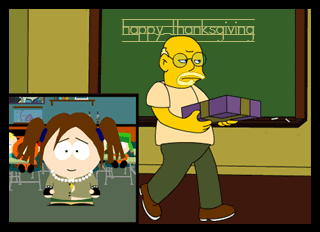I just spoke with a gentleman who helps run Second Life, and he informed me that there are, like, a billion librarians on SL, who own a string of islands and facilitate information exchange. Can anyone confirm this?
Are we cool or what?
Guess who drank too much last night? Everyone!
It’s hangover day here at South by Southwest. The panels are slow and attendance is low.
This morning I went to a panel debating the merits of ignoring users. It matched my mood nicely.
User profiles are taking a beating this year.
Guess who was the only woman in the gaming room playing Guitar Hero and shooting bunnies with the Wii? You may call me Token.
Reverend Billy and the Church of No Shopping are here. They’re staying at our hotel, which was kind of startling when I crawled out of the elevator this morning.
I’m going to try and find someone from the Creative Commons who wants to come speak at Cornell about using the CC in scientific publications. If you know anyone, give me a holler.
I tried out Cornell Library’s book-delivery service this week. A nice stack of David Foster Wallace books quickly appeared at my workplace yesterday afternoon, and I got a friendly call when they arrived.
 If you are a Cornell student or staff, you can have library books delivered to any library-location of your choice for free. For me, this means walking upstairs to our sunny little ornithology library overlooking the pond, and sitting by the fireplace for a bit.
If you are a Cornell student or staff, you can have library books delivered to any library-location of your choice for free. For me, this means walking upstairs to our sunny little ornithology library overlooking the pond, and sitting by the fireplace for a bit.
I’m an irredeemable Amazon.com addict, so I view as a right the ability to learn about a book, click a few links, and have said book delivered to me. Imagine my pleasure at being able to do this without paying for it.
 Unfortunately, you pretty much have to be told about the service to find out about it, unless you are the type of user who clicks links labeled “requests” on library websites and enjoy library jargon. Like many public services in the country, the crucial step of communicating to humans was overlooked.*
Unfortunately, you pretty much have to be told about the service to find out about it, unless you are the type of user who clicks links labeled “requests” on library websites and enjoy library jargon. Like many public services in the country, the crucial step of communicating to humans was overlooked.*
*Many nonprofits seem to say to their clients: “Look, we provide a valuable and benevolent service. You could at least be arsed enough to jump through a few design hurdles in order to discover our valuable service that you don’t know exists because of our design hurdles.”
I’m not sure, but I think the Cornell Library Patron narrative is supposed to go like this:
 A MIRACLE OCCURS HERE
A MIRACLE OCCURS HERE The patron chooses “Book Delivery Services (9996 available)” from a dropdown list conveniently located below the fold.
The patron chooses “Book Delivery Services (9996 available)” from a dropdown list conveniently located below the fold. The patron knows that, unlike use of the weight rooms, climbing wall, or campus cinema, the library book delivery service is free.
The patron knows that, unlike use of the weight rooms, climbing wall, or campus cinema, the library book delivery service is free.Still, mad useful if you know about it.
 The financial advice site Get Rich Slowly suggests using the library as a frugal way to save money on books. I agree, and am going to endure more bad OPAC design in the interest of financial progress. Stay tuned.
The financial advice site Get Rich Slowly suggests using the library as a frugal way to save money on books. I agree, and am going to endure more bad OPAC design in the interest of financial progress. Stay tuned.
Cornell librarians: Please do not kill me. I’m glad to have your services. Bad online user experiences are common in the library world. I’m sure you are busy right now improving the OPAC and writing clear non-jargon filled text describing your services. Go Big Red!
I got my New York Public Library card in the mail today.
 Anyone who lives in New York state is eligible for a card, so I now have access to the library’s impressive collection of online resources.
Anyone who lives in New York state is eligible for a card, so I now have access to the library’s impressive collection of online resources.
I spent the morning refreshing my Spanish at the NYPL’s Online Language Learning Center. It uses the Rosetta Stone software, which now has a place on my desert island list of media resources, along with the White Album and the entire first season of The Dog Whisperer.
If you haven’t used or seen Rosetta Stone, it is Language learning software with the remarkable ability to hack your brain and force it to actually understand and remember all of those verb conjugations you had to memorize back in college.  The lessons are reinforced with audio, video, writing and images, so it imitates an immersion experience more than a typical grammar-based language course. There’s even a module that has you speak into a microphone and shows you a waveform comparing your speech with someone who doesn’t suck.
The lessons are reinforced with audio, video, writing and images, so it imitates an immersion experience more than a typical grammar-based language course. There’s even a module that has you speak into a microphone and shows you a waveform comparing your speech with someone who doesn’t suck.
I haven’t explored the other web resources, but I’m tickled at getting access to this one. The software is in the $300 range, and Cornell doesn’t have a license, so I feel like I’ve gotten my taxes worth this year. Thanks NYPL!
 One of my student employees, Katie, is being recruited by IBM. We’re proud of her, and not a bit surprised. Our other student, Zach, is trying to decide between working at Google or Amazon. They will be lucky to have him.
One of my student employees, Katie, is being recruited by IBM. We’re proud of her, and not a bit surprised. Our other student, Zach, is trying to decide between working at Google or Amazon. They will be lucky to have him.
One of the advantages to doing web development at a University, is that you get to work with Google-caliber people, but get to pay them student slave wages. For some reason they don’t seem to mind.
So, in honor of our super students, I’d like to direct you to these official IBM Songs that you can listen to online from their corporate archives. Enjoy, and remember: We are the men! Of IBM!
So here’s what my family of first and second-generation geeks does on Thanksgiving once the stuffing has been consumed:

Good design can make anything wonderful. Even something as dreary as surge protectors. I came across these in my e-travels.
 Belkin Clamp-On Surge Protector
Belkin Clamp-On Surge Protector
I do grow so weary of crawling under my desk every day and messing up my chic outfit. No, I’m not reenacting scenes from Secretary. I work in a digital library. Gordian knots of power cables are part of my life.
But checkitout: this surge protector has a clamp on it so you can attach it to your desk, or another convenient surface. Finally, I can unplug the router with dignity.
 The Power Squid is my friend. He is a squid-shaped surge protector. Instead of forcing you into unaccommodating rows, his noodely appendages absorb plugs of all shapes and sizes.
The Power Squid is my friend. He is a squid-shaped surge protector. Instead of forcing you into unaccommodating rows, his noodely appendages absorb plugs of all shapes and sizes.
I plan on getting three of him: one for each office, and one for that damned outlet by the kitchen that only half-works, yet is so conveniently placed.
 The Power Strip Liberator will save you from huge annoying black bricks that take over your power strip. Instead of letting those monsters take over three entire outlets, plug them into this doohickey and let ’em loom menacingly somewhere else.
The Power Strip Liberator will save you from huge annoying black bricks that take over your power strip. Instead of letting those monsters take over three entire outlets, plug them into this doohickey and let ’em loom menacingly somewhere else.